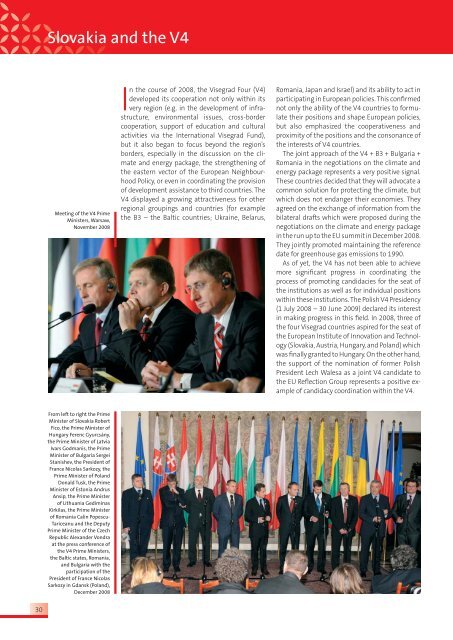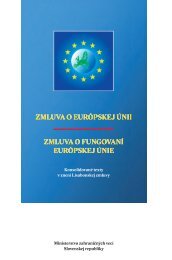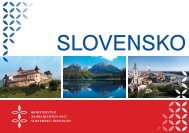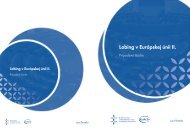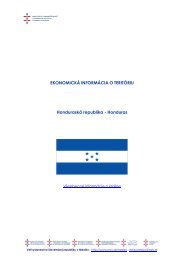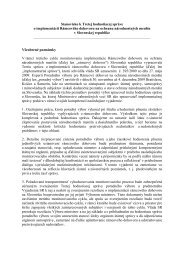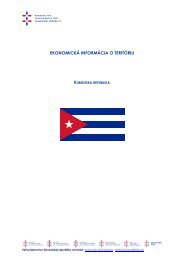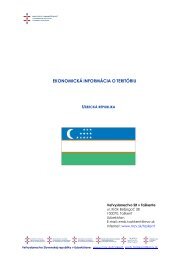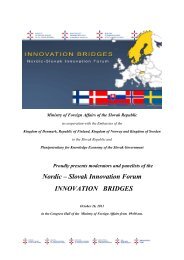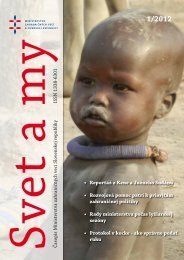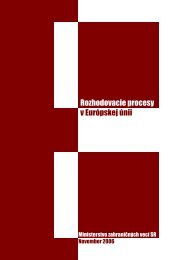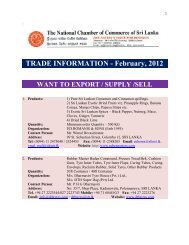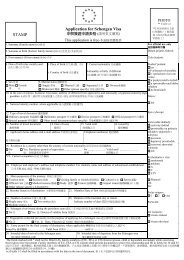Annual Report Ministry of Foreign Affairs of the Slovak Republic 2008
Annual Report Ministry of Foreign Affairs of the Slovak Republic 2008
Annual Report Ministry of Foreign Affairs of the Slovak Republic 2008
You also want an ePaper? Increase the reach of your titles
YUMPU automatically turns print PDFs into web optimized ePapers that Google loves.
<strong>Slovak</strong>ia and <strong>the</strong> V4<br />
Meeting <strong>of</strong> <strong>the</strong> V4 Prime<br />
Ministers, Warsaw,<br />
November <strong>2008</strong><br />
In <strong>the</strong> course <strong>of</strong> <strong>2008</strong>, <strong>the</strong> Visegrad Four (V4)<br />
developed its cooperation not only within its<br />
very region (e.g. in <strong>the</strong> development <strong>of</strong> infrastructure,<br />
environmental issues, cross-border<br />
cooperation, support <strong>of</strong> education and cultural<br />
activities via <strong>the</strong> International Visegrad Fund),<br />
but it also began to focus beyond <strong>the</strong> region’s<br />
borders, especially in <strong>the</strong> discussion on <strong>the</strong> climate<br />
and energy package, <strong>the</strong> streng<strong>the</strong>ning <strong>of</strong><br />
<strong>the</strong> eastern vector <strong>of</strong> <strong>the</strong> European Neighbourhood<br />
Policy, or even in coordinating <strong>the</strong> provision<br />
<strong>of</strong> development assistance to third countries. The<br />
V4 displayed a growing attractiveness for o<strong>the</strong>r<br />
regional groupings and countries (for example<br />
<strong>the</strong> B3 – <strong>the</strong> Baltic countries; Ukraine, Belarus,<br />
Romania, Japan and Israel) and its ability to act in<br />
participating in European policies. This confirmed<br />
not only <strong>the</strong> ability <strong>of</strong> <strong>the</strong> V4 countries to formulate<br />
<strong>the</strong>ir positions and shape European policies,<br />
but also emphasized <strong>the</strong> cooperativeness and<br />
proximity <strong>of</strong> <strong>the</strong> positions and <strong>the</strong> consonance <strong>of</strong><br />
<strong>the</strong> interests <strong>of</strong> V4 countries.<br />
The joint approach <strong>of</strong> <strong>the</strong> V4 + B3 + Bulgaria +<br />
Romania in <strong>the</strong> negotiations on <strong>the</strong> climate and<br />
energy package represents a very positive signal.<br />
These countries decided that <strong>the</strong>y will advocate a<br />
common solution for protecting <strong>the</strong> climate, but<br />
which does not endanger <strong>the</strong>ir economies. They<br />
agreed on <strong>the</strong> exchange <strong>of</strong> information from <strong>the</strong><br />
bilateral drafts which were proposed during <strong>the</strong><br />
negotiations on <strong>the</strong> climate and energy package<br />
in <strong>the</strong> run up to <strong>the</strong> EU summit in December <strong>2008</strong>.<br />
They jointly promoted maintaining <strong>the</strong> reference<br />
date for greenhouse gas emissions to 1990.<br />
As <strong>of</strong> yet, <strong>the</strong> V4 has not been able to achieve<br />
more significant progress in coordinating <strong>the</strong><br />
process <strong>of</strong> promoting candidacies for <strong>the</strong> seat <strong>of</strong><br />
<strong>the</strong> institutions as well as for individual positions<br />
within <strong>the</strong>se institutions. The Polish V4 Presidency<br />
(1 July <strong>2008</strong> – 30 June 2009) declared its interest<br />
in making progress in this field. In <strong>2008</strong>, three <strong>of</strong><br />
<strong>the</strong> four Visegrad countries aspired for <strong>the</strong> seat <strong>of</strong><br />
<strong>the</strong> European Institute <strong>of</strong> Innovation and Technology<br />
(<strong>Slovak</strong>ia, Austria, Hungary, and Poland) which<br />
was finally granted to Hungary. On <strong>the</strong> o<strong>the</strong>r hand,<br />
<strong>the</strong> support <strong>of</strong> <strong>the</strong> nomination <strong>of</strong> former Polish<br />
President Lech Walesa as a joint V4 candidate to<br />
<strong>the</strong> EU Reflection Group represents a positive example<br />
<strong>of</strong> candidacy coordination within <strong>the</strong> V4.<br />
From left to right <strong>the</strong> Prime<br />
Minister <strong>of</strong> <strong>Slovak</strong>ia Robert<br />
Fico, <strong>the</strong> Prime Minister <strong>of</strong><br />
Hungary Ferenc Gyurcsány,<br />
<strong>the</strong> Prime Minister <strong>of</strong> Latvia<br />
Ivars Godmanis, <strong>the</strong> Prime<br />
Minister <strong>of</strong> Bulgaria Sergei<br />
Stanishev, <strong>the</strong> President <strong>of</strong><br />
France Nicolas Sarkozy, <strong>the</strong><br />
Prime Minister <strong>of</strong> Poland<br />
Donald Tusk, <strong>the</strong> Prime<br />
Minister <strong>of</strong> Estonia Andrus<br />
Ansip, <strong>the</strong> Prime Minister<br />
<strong>of</strong> Lithuania Gediminas<br />
Kirkilas, <strong>the</strong> Prime Minister<br />
<strong>of</strong> Romania Calin Popescu-<br />
Tariceanu and <strong>the</strong> Deputy<br />
Prime Minister <strong>of</strong> <strong>the</strong> Czech<br />
<strong>Republic</strong> Alexander Vondra<br />
at <strong>the</strong> press conference <strong>of</strong><br />
<strong>the</strong> V4 Prime Ministers,<br />
<strong>the</strong> Baltic states, Romania,<br />
and Bulgaria with <strong>the</strong><br />
participation <strong>of</strong> <strong>the</strong><br />
President <strong>of</strong> France Nicolas<br />
Sarkozy in Gdansk (Poland),<br />
December <strong>2008</strong><br />
30


